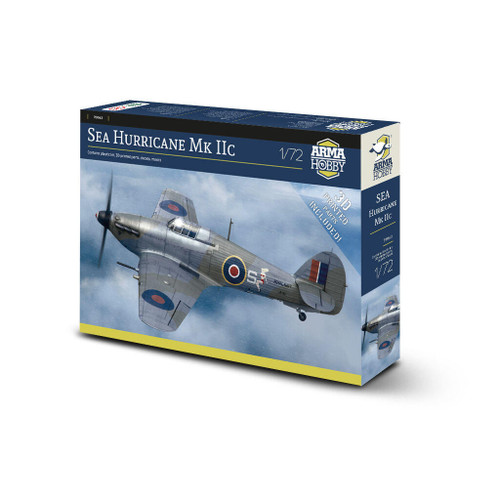Description
Hawker Hurricane Mk I Expert Set Arma Hobby 1/72
Legendary fighter aeroplane Hawker Hurricane Mk I in "Battle of Britain" version - with metal wings, extensive cockpit and wheel bay interior, two types of propeller and three types of spinner and with tropical filter option.
Model of the Hurricane for intemediate/advanced modelers, with accessories included
Set contains
- Plastic parts
- Photoetched parts
- Canopy and wheel masks
- Techmod decals with four markings options
Markings
- Hurricane MkI , serial P3059, fuselage code SD-N from 501 Squadron RAF, August 1940. Aeroplane piloted, among others by Polish fighter pilot Sgt Antoni Głowacki
- Hurricane MkI , serial V7234, SD-A from 501 Squadron RAF, August 1940. The most successful aeroplane of Sgt Antoni Głowacki. Credited with six shoots down and one damaged aircraft of the Luftwaffe. Glowacki has achieved five kills in one day (24 August 1940) and became the only „one day ace” in Battle of Britain
- Hurricane MkI , serial R4175, fuselage code RF-R From 303 Polish/RAF Squadron, pilot Sgt Josef Frantisek has shot down seven of his seventeen kills during the Battle of Britain. Unfortunately, he was killed when accidentally crashed this aeroplane on the ground during patrol flight on 8th October 1940.
- Hurricane MkI trop, serial 284, fuselage code „yellow J”, 3 Squadron SAAF, Kenia 1941. Pilot Lt. Robert Kershaw has rescued his shot down commander, Cpt. John Frost, after Diredawa (Ethiopia) air raid on 15 March 1941.
Hawker Hurricane Mk.I - History of the Aeroplane
Designed in 1935 Hawker Hurricane Mk.I was the first modern fighter airplane which was made for the Royal Air Force. It was created by Sydney Camm – the chief designer of the Hawker Siddeley Company.
Although its design was similar to earlier Hawker’s planes (fuselage framework of round tubes and metal and fabric surface), it made great quality change for the Royal Air Force Fighter Command. The most important features were closed cockpit, rectractable undercarriage and big firepower – 8 7.7mm Browning machine guns. Its heart were famous Rolls Royce Merlin II and III engines.
The first Hurricanes started replacing older biplane fighters (i.e Hawker Fury, Gloster Gauntlet and Gladiator) in December 1936. At the outbreak of the second world war 16 squadrons were operational. The Hurricanes sent to France drew first blood in combats with German Luftwaffe. After bloody struggle in France and Norway Royal Air Force Fighter Command had to face the enemy over England.
As there were more Hurricane squadrons than Spitfire ones during the Battle of Britain, Hawker’s fighter should bear a name of “Defender of the Empire”
Hawker Hurricane was also the first type of British fighters used by Polish day fighter squadrons formed in the United Kingdom before introducing more modern Spitfires.
With the production growing more Hurricanes were sent to other parts of the British Empire where British forces faced Germans and Italians – to Malta, East and North Africa.
Technical data:
Lenght: 9.55
Height: 3.95m
Wing span: 12,9 m
Empty weight: 2120 kg, takeoff weight: 2924 kg
Maximum speed. 521 km/h at 5425m
Absolute ceiling: 10780m
Range: 684 km
Powerplant: 1 Rolls Royce Merlin II 1030 hp or Rolls Royce Merlin III 1029hp
Armament: 8 Browning machine guns 7,69 mm














